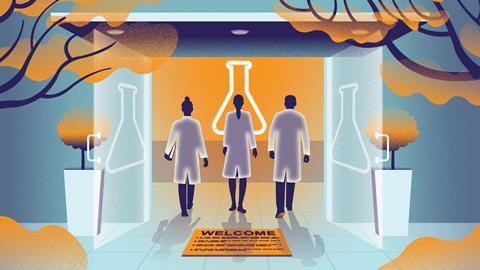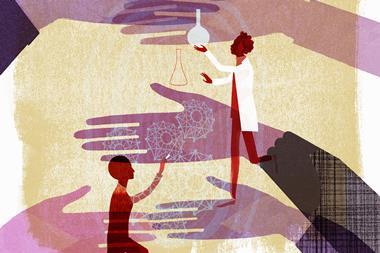The power of a positive philosophy
The code of conduct is a staple of HR documentation. But in labs – filled with safety notices, instruction manuals and standard procedures – guidelines on the less practical aspects of research work are often curiously absent. Relying on assumed behavioural rules can be risky and many PIs are now choosing to explicitly outline their expectations, values and group procedures in public documents online.
For Lauren McKee, a glycoscientist at the KTH Royal Institute of Technology in Sweden, creating and sharing her personal philosophy was a proactive and informal way to instigate a positive change within her group. ‘We call it the welcome document rather than the code of conduct so people have a positive mindset when they read it,’ she says. ‘It’s not prescriptive, but suggestive and encouraging. You won’t get into trouble if you don’t behave this way but it’ll be a great workplace if you do!’
McKee’s group shares a single lab space with seven other groups. Communal spaces can be challenging to navigate and mismatched expectations can quickly escalate from simple miscommunications to conflict. ‘Lots of silly disputes like getting access to machines or sharing credit for work were taking up a disproportionate amount of our time and energy,’ she explains. ‘I really pushed for some sort of lab guidelines and we decided as a department to write a code of conduct document so that we would have a framework for solving and hopefully preventing these problems in the future.’
McKee’s group philosophy explicitly outlines the policies surrounding issues such as using communal equipment, initiating and crediting collaborations, and sharing general lab responsibilities. New members therefore enter the lab with a full awareness of how the group and wider department operate and have a clear understanding of their own responsibilities and the roles of those around them.
Group guidelines can also be an effective way to uphold social values. ‘It’s about fostering a sense of belonging and creating an environment that feels welcoming to people. Where everybody feels like they matter and that their identity is valued and respected,’ explains Stefania Impellizzeri, a materials chemist at Toronto Metropolitan University in Canada. Creating a flexible and inclusive research culture is fundamental to how Impellizzeri runs her group and her code of conduct emphasises the importance of respect towards other researchers by encouraging her students to actively engage with diversity, equality and inclusion initiatives and challenge problematic behaviour.
Group members have the freedom to manage the way they work themselves and Impellizzeri is keen to stress that the focus is always on project milestones and not the number of results. ‘I don’t police work hours,’ she explains. ‘It’s important to recognise that there are different commitments, medical appointments, caring responsibilities, etc that people have which I may not be aware of.’
An open, inclusive and healthy environment is better for everyone
Aside from supporting her core value of inclusivity, Impellizzeri also believes that this lower-pressure approach to experimental work promotes better research quality and integrity. ‘When you take away the constant pressure for results it reduces the chances of misconduct and publication plagiarism. It’s that pressure which often leads to this kind of misconduct and diminished ethical decision-making – when researchers feel like they have to show you positive results. It’s a form of psychological stress,’ she says.
Productivity pressure has also been responsible for one of the other big problems in research: poor mental health. It’s a topic McKee is keen to address and she believes the group document can be a powerful tool to champion personal wellbeing. Her guidelines remind individuals to prioritise their mental health by making time for themselves, and to check in on colleagues who may be struggling. ‘I wrote a mental health section as a reaction to things that I had seen and experienced,’ she says. ‘Those experiences can be devastating on a personal level and can mean the work comes to a stop for quite a long period of time, which can be stressful in itself.’
McKee’s page shares some of the doubts and concerns commonly held by researchers, alongside tips to overcome negative feelings and links to appropriate university resources and services. ‘I hope having it there makes it plain to people that they can come to me,’ she says. ‘An open, inclusive and healthy environment is better for everyone.’
For both McKee and Impellizzeri, introducing guidelines that reflect their values has been a hugely positive step. To maximise the benefit for your group, McKee suggests opening up the process with a discussion: ‘Make it a collaborative effort – you’re probably not going to have the same issues in mind as the rest of your team.’ Impellizzeri hopes that positive, inclusive attitudes will become embedded in research culture. ‘The greatest impact I will ever have will be the people that I’m training and mentoring,’ she says. ‘That’s the new generation. Regardless of what I publish, that’s going to be my legacy.’


















No comments yet